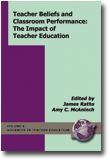
Teacher Beliefs and Classroom Performance
The Impact of Teacher Education
By:
James Raths, University of Delaware
Amy C. McAninch, Rockhurst University
A volume in the series: Advances in Teacher Education. Editor(s): Diane Yendol-Hoppey, University of North Florida. David T. Hoppey, University of North Florida. Jennifer L. Snow, Boise State University. Jennifer Jacobs, University of South Florida.
Published 2003
This volume of Advances in Teacher Education is about beliefs held by teachers and addresses the important topic of teacher beliefs from a variety of disciplinary perspectives. Most of the authors who have contributed to this collection of essays assume that beliefs are propositions that are felt to be true by the person embracing them, but that do not necessarily rest on the kind of evidence that justifies the use of the term “knowledge.” Teacher beliefs are an important topic because it is hypothesized that teachers and teacher candidates use them to shape the information they receive from formal teacher preparation and to direct subsequent decision-making in the classroom.
CONTENTS
Foreword, Amy C. McAninch and James Raths. Preservice Teachers’ Beliefs, Virginia Richardson. Prompting the Development of Pre-service Teachers’ Beliefs through Cases, Action Research, Problem-based Learning and Technology, Mary Anna Lundeberg and Barbara B. Levin. Teacher Beliefs, Performance, and Proficiency in Diversity-oriented Teacher Preparation, Peter C. Murrell, Jr. and Michele Foster. Is Realism a Better Belief than Nominalism?: Re-opening the Ancient Debate, Richard S. Prawat. At the Heart of Teaching: The Role of Emotion in Changing Teachers’ Beliefs, Patricia Ashton and Michele Gregoire-Gill. Teacher Education and Teachers’ Beliefs, Maria Teresa Tatto and David Bryan Coupland. The Impact of Schools on Teacher Beliefs, Influence, and Student Achievement: The Role of Collective Efficacy Beliefs, Roger D. Goddard.
-
Paperback978-1-59311-068-0
Web price: $45.04 (Reg. 52.99)
-
Hardcover978-1-59311-069-7
Web price: $80.74 (Reg. 94.99)
- eBook9781607529651

-
 (Re)Designing Programs:
A Vision for Equity-Centered, Clinically Based Teacher Preparation
(Re)Designing Programs:
A Vision for Equity-Centered, Clinically Based Teacher Preparation
-
 Collaboration, Narrative, and Inquiry That Honor the Complexity of Teacher Education
Collaboration, Narrative, and Inquiry That Honor the Complexity of Teacher Education
-
 Cultivating Democratic Literacy Through the Arts
Guiding Preservice Teachers Towards Innovative Learning Spaces in ELA Classrooms
Cultivating Democratic Literacy Through the Arts
Guiding Preservice Teachers Towards Innovative Learning Spaces in ELA Classrooms
-
 Exemplary Clinical Models of Teacher Education
Exemplary Clinical Models of Teacher Education
-
 Pathways Into Teacher Education
Profiles of Emerging Teacher Educator Development
Pathways Into Teacher Education
Profiles of Emerging Teacher Educator Development
-
 Preparing the Next Generation of Teacher Educators for Clinical Practice
Preparing the Next Generation of Teacher Educators for Clinical Practice
-
 Professional Learning Journeys of Teacher Educators
Professional Learning Journeys of Teacher Educators

